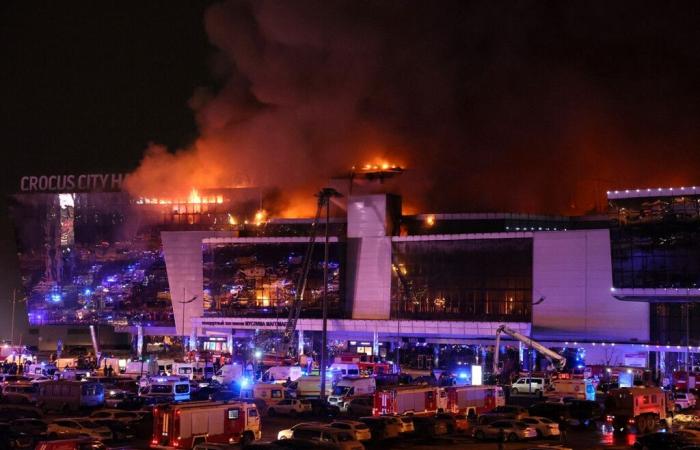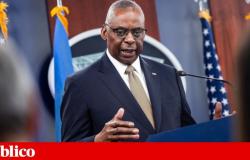Vladimir Putin had stated that the Ukrainian attacks on Belgorod would not go unanswered. This appears to have arrived in two days: on the first, with the firing of missiles on the Ukrainian capital on a scale unprecedented in the last month and a half; and in the second, on Friday, with 90 missiles and 60 drones in various regions of the country, having killed at least five people, injured 26, and left more than a million people without power, in Kharkiv. This new destructive impulse comes as the Kremlin recognizes that it is “in a state of war” ten years after the annexation of Crimea and the proxy war in eastern Ukraine, and two years after the invasion it dubbed “Special Military Operation”. In parallel, a concert hall in a suburb of Moscow was the target of a terrorist attack, two weeks after a warning issued by the United States to that effect.
The Crocus City Hall, an auditorium with a capacity for more than 6,000 people located in Krasnogorsk, on the western edge of Moscow, was preparing to host a concert by the Russian rock group Picnic when an undetermined number of armed men opened fire on the crowd, used explosives and caused a large fire. The Russian prosecutor general’s office said that “unidentified and camouflaged people broke into the Crocus City Hall and started shooting before the start of the concert,” according to the TASS news agency. The RIA Novosti agency said that the men “opened fire with automatic weapons” and “threw a grenade or an incendiary bomb, which caused a fire” in the concert hall.
Preliminary figures point to more than 60 deaths, but the “number could increase”, according to the latest provisional report from the Russian Investigative Committee, cited by AFP. After the Mayor of Moscow, Sergei Sobyanin, classified what happened as a “terrible tragedy” and canceled all public events scheduled for the weekend, the Russian Investigative Committee announced that it would launch a criminal investigation under the from the article on terrorist acts.
On the 7th of this month, the US embassy issued a warning about “imminent plans to attack large gatherings in Moscow, including concerts” by “extremists”. The diplomatic services advised fellow citizens to avoid gatherings, although the warning was only valid for the next 48 hours. Other embassies in the Russian capital, including the Portuguese one, issued similar warnings. The American warning came after the FSB reported that it had prevented an attack on a synagogue in Moscow by an Islamic State cell.
According to the KGB’s successor, the terrorist group’s cell was operating in the Russian region of Kaluga (about 200km southwest of Moscow), part of the group’s Afghan branch, known as ISIS-Khorasan, which aims to create an Islamic caliphate. from Pakistan to Iran, including the former Soviet republics of Central Asia.
Hours after the attack, the Islamic State claimed responsibility for the attack. An American official, cited by the Washington Postsaid the United States had “no reason to doubt” the claim.
It would not be the first attack by Islamists on Russian soil, including on planes and trains. The deadliest events occurred in 2002 and 2004. In the first, Chechen separatists took around 800 people hostage at the Dubrovka Theater in Moscow, although here the tragedy was at the hands of Russian special forces. They spread a narcotic gas in the building that proved deadly: 129 hostages and 41 Chechen militants died, due to the effects of the chemical attack and the shooting that followed. In September 2004, it was the turn of another armed group of Chechens, around 30, to take over a school in Beslan, in North Ossetia, in southern Russia. They took hundreds of hostages and the siege by Russian forces ended two days later in a bloodbath, in which more than 330 people, half of whom were children, were killed.
Chechnya has long been a pacified territory thanks to the oppressive reign of the Kadyrovs. However, Russia’s participation in the Syrian war as an ally (and savior) of Bashar al-Assad through a brutal bombing campaign, which reportedly included chemical weapons, earned the mortal hatred of many Muslims, in addition to the Syrians who were the first-hand victims.
The man destined by Vladimir Putin to raise tension with the West, former president Dmitri Medvedev, immediately appeared to threaten Ukraine. “If it is established that these are terrorists from the Kiev regime, they will be located and destroyed without mercy, like terrorists. Including the leaders of the state that committed such an atrocity,” said Medvedev, vice-president of the Russian Security Council.
The Ukrainian presidency responded through its advisor Mikhailo Podolyak, who rejected any connection “with these events” and with “terrorist methods of war”. The Ukrainian Foreign Ministry “categorically rejected the accusations that began to be made by Russian authorities that Ukraine was involved in the shooting”, alluding to a “provocation planned by the Kremlin with the aim of further fueling anti-Ukrainian hysteria in Russian society”.
The United States also said there were no indications that Ukrainians were involved, according to White House Security Council spokesman John Kirby.
Remember that in 2022 a terrorist attack killed Darya Dugina, daughter of Putin’s regime ideologue Aleksander Dugin, on the outskirts of Moscow; and in 2023, in Saint Petersburg, an influential blogger in favor of the invasion of Ukraine, Vladlen Tatarsky, was also the victim of an explosion. In both cases Moscow suspected Kiev. A small group opposing Putin, called the National Republican Army, claims to be responsible for the two attacks. Another Russian group, this one proven to be active in the Belgorod region, the Legion of Freedom, reported having no connection with the attack on the concert hall, having accused “Putin’s terrorist regime” of having “prepared” this “bloody provocation”. The Ukrainian Military Intelligence Services (GUR) reacted with the same logic. “The objective is to justify even more powerful bombings against Ukraine and a total mobilization in Russia.”
In an interview published on Friday, Kremlin spokesman Dmitri Peskov announced that the country is “in a state of war”. He explained: “It started out as a special military operation, but as soon as this whole gang formed, when the West participated in all this on the side of Ukraine, for us it became a war.” A semantic change days after Vladimir Putin – who has been subject to an arrest warrant by the International Criminal Court for a year – secured a new six-year term.
When using the term prohibited to other Russians, Peskov said that Russians need to understand “internal mobilization”, an expression that could open the door to new military mobilization to fulfill the objectives of the invasion and annexation of Ukrainian regions. The admission of war marks “an important stage in the construction of the narrative of a fight against the West, in which Ukraine is just a battlefield”, comments Jeff Hawn, Russia expert at the London School of Economics, to France24.





